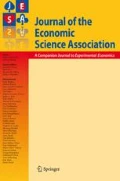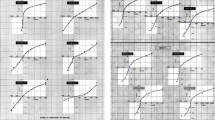Abstract
This paper studies individuals’ preference for reducing advantageous inequality in the distribution of gains and losses. Combining the inequality aversion model of Fehr and Schmidt (Q J Econ 114(3):817–868, 1999) with loss aversion à la Kahneman and Tversky (Econom J Econom Soc:263–291, 1979), we predict the relative dislike for advantageous inequality is lower when outcomes are framed as losses than when outcomes are framed as gains. We test this prediction using data from two modified dictator game experiments. Consistent with the model, we find that the amount of payoff that subjects are willing to sacrifice to increase the net payoff of others and reduce advantageous inequality is smaller under a loss frame than under a gain frame. The results also show that women are more inequality averse than men in both gains and losses.


Similar content being viewed by others
Notes
In Attanasi et al. (2016), there were in total three tasks: (i) elicitation of advantageous inequality aversion, (ii) risk aversion, and (iii) a strategic game. Lampach et al. (2016) introduced four tasks in the experiment: (i) elicitation of advantageous inequality aversion, (ii) risk aversion, (iii) ambiguity aversion and (iv) a liability game.
Instructions are presented in Supplementary Materials.
References
Abeler, J., Falk, A., Goette, L., & Huffman, D. (2011). Reference points and effort provision. The American Economic Review, 101(2), 470–492.
Andreoni, J., & Vesterlund, L. (2001). Which is the fair sex? Gender differences in altruism. Quarterly Journal of Economics, 116, 293–312.
Attanasi, G., Boun My, K., Georgantzis, N., & Ginés, M. (2016). Strategic altruism as complementarity-building investment (in preparation).
Benartzi, S., & Thaler, R. (1995). Myopic loss aversion and the equity premium puzzle. The Quarterly Journal of Economics, 110(1), 73–92.
Beranek, B., Cubitt, R., & Gächter, S. (2015). Stated and revealed inequality aversion in three subject pools. Journal of the Economic Science Association, 1(1), 43–58.
Blanco, M., Engelmann, D., & Normann, H. T. (2011). A within-subject analysis of other-regarding preferences. Games and Economic Behavior, 72(2), 321–338.
Buchan, N., Croson, R., Johnson, E., & Wu, G. (2005). Gain and loss ultimatums. Advances in Applied Microeconomics, vol. 13, Chapter 3 (pp. 1–23). Greenwich, CT: JAI Press.
Cameron, C., & Miller, D. (2015). A practitioner’s guide to cluster-robust inference. Journal of Human Resources, 50(2), 317–372.
Carnevale, P. (2008). Positive affect and decision frame in negotiation. Group Decision Negotiation, 17(1), 51–63.
Croson, R., & Gneezy, U. (2009). Gender differences in preferences. Journal of Economic Literature, 47(2), 448–474.
De Dreu, C. (1994). Effects of gain-loss frames on satisfaction with self-other outcome differences. European Journal of Social Psychology, 24, 497–510.
De Dreu, C., Carnevale, P., Emans, B., & Van De Vliert, E. (1994). Effects of gain-loss frames in negotiation: Loss aversion, mismatching, and frame adoption. Organizational Behavior and Human Decision Processes, 60, 90–107.
Dickinson, D. L., & Tiefenthaler, J. (2002). What is fair? Experimental evidence. Southern Economic Journal, 69(2), 414–428.
Dufwenberg, M., & Astri, M. (2005). Gender composition in teams. Journal of Economic Behavior & Organization, 61, 50–54.
Fehr, E., & Fischbacher, U. (2006). The economics of fairness, reciprocity and altruism—experimental evidence and new theories. Handbook of the Economics of Giving, Altruism and Reciprocity, 1, 615–691.
Fehr, S., & Schmidt, K. (1999). A theory of fairness competition and cooperation. The Quarterly Journal of Economics, 114(3), 817–868.
Greiner, B. (2015). Subject pool recruitment procedures: Organizing experiments with ORSEE. Journal of the Economic Science Association, 1(1), 114–125.
Kahneman, D., & Tversky, A. (1979). Prospect theory: An analysis of decision under risk. Econometrica, 47(2), 263–291. https://doi.org/10.2307/1914185.
Kahneman, D., Knetsch, J., & Thaler, R. (1991). Anomalies: The endowment effect, loss aversion, and status quo bias. Journal of Economic Perspectives, 5(1), 193–206.
Lampach, N., Boun My, K., & Spaeter, S. (2016). Risk, ambiguity and efficient liability rules: An experiment. Working Papers of BETA 2016-30. Bureau d'Economie Théorique et Appliquée, UDS, Strasbourg. www.beta-umr7522.fr/productions/publications/2016/2016-29.pdf.
Leliveld, M., van Beest, I., van Dijk, E., & Tenbrunsel, A. E. (2009). Understanding the influence of outcome valence in bargaining: A study on fairness accessibility, norms, and behavior. Journal of Experimental Social Psychology, 45(1), 505–514.
Loewenstein, G., Thompson, L., & Bazerman, M. (1989). Social utility and decision making in interpersonal contexts. Journal of Personality and Social Psychology, 57(3), 426–441.
Neumann, T., Schosser, S., & Vogt, B. (2017). Ultimatum bargaining over losses and gains—an experimental comparison. Social Science Research, 67, 49–58.
Poppe, M., & Valkenberg, H. (1993). Effects of gain versus loss and certain versus probable outcomes on social value orientations. European Review of Social Psychology, 33(3), 331–337.
Rabin, M. (2000). Risk aversion and expected-utility theory: A calibration theorem. Econometrica, 68(5), 1281–1292.
Samuelson, W., & Zeckhauser, R. (1988). Status quo bias in decision making. Journal of Risk and Uncertainty, 1(1), 7–59.
Schweitzer, E., & DeChruch, L. (2001). Linking frames in negotiations: Gains, losses and conflict frame adoption. The International Journal of Conflict Management, 12(2), 100–113.
Selten, R., & Ockenfels, A. (1998). An experimental solidarity game. Journal of Economic Behavior & Organization, 34(4), 517–539.
Tversky, A., & Kahneman, D. (1992). Advances in prospect theory: Cumulative representation of uncertainty. Journal of Risk and uncertainty, 5(4), 297–323.
Walasek, L., Mullett, T.L., & Stewart, N. (2018). A meta-analysis of loss aversion in risky contexts. Working paper. https://ssrn.com/abstract=3189088 or http://dx.doi.org/10.2139/ssrn.3189088 (Available at SSRN).
Zhou, X., & Wu, Y. (2011). Sharing losses and sharing gains: Increased demand for fairness under adversity. Journal of Experimental Social Psychology, 47(3), 582–588.
Author information
Authors and Affiliations
Corresponding author
Additional information
The authors gratefully acknowledge financial support by the project “Creative, Sustainable Economies and Societies” (CSES) coordinated by Robin Cowan, funded through the University of Strasbourg IDEX Unistra. We thank Giuseppe Attanasi, Dominik Bauer, Tarek Jaber-Lopez, Russel Neudorf, Sandrine Spaeter, Gisèle Umbhauer, the Editor and two anonymous reviewers of the Journal of Economic Science Association for their helpful and constructive comments. All remaining errors are our own.
Electronic supplementary material
Below is the link to the electronic supplementary material.
Rights and permissions
About this article
Cite this article
Boun My, K., Lampach, N., Lefebvre, M. et al. Effects of gain-loss frames on advantageous inequality aversion. J Econ Sci Assoc 4, 99–109 (2018). https://doi.org/10.1007/s40881-018-0057-2
Received:
Accepted:
Published:
Issue Date:
DOI: https://doi.org/10.1007/s40881-018-0057-2




